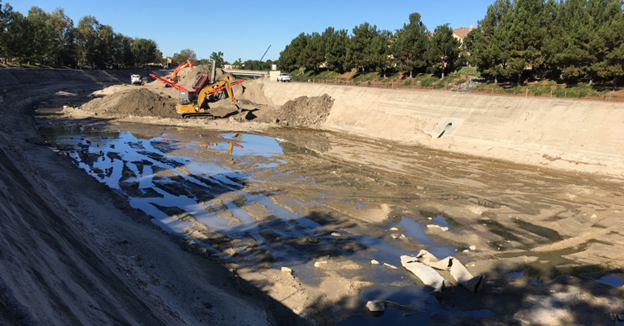The SMC has begun working to identify the environmental stressors in Southern California modified channels that are major contributors to the degradation of the streams’ biological communities – key insights that could help watershed managers take more informed, effective actions to improve the ecological health of these streams.
The three-year study, expected to be completed in 2025, is evaluating multiple candidate stressors – including eutrophication, salinization, habitat alteration, and water temperature – to understand which stressor(s) are having the biggest influence on the biological integrity of Southern California’s perennially and intermittently flowing modified channels.
Researchers also are evaluating if routine channel maintenance activities that are intended to preserve a channel’s flood protection functions can have an influence on its biological integrity. The goal is to help city and county stormwater managers achieve their dual mission to protect biological integrity and to maintain the channels’ crucial flood protection and water conveyance services.
Compared to unmodified streams, streams that have been modified through hardening of their banks and/or bottom, and/or through changes to their channel shape, are much more likely to receive lower biological condition scores. Channel modification can eliminate habitats for aquatic organisms, disrupt natural hydrologic and sediment regimes, result in water temperature changes, and enhance susceptibility to eutrophication.

The biological integrity of modified channels has come into sharp focus in recent years following the development of stream condition scoring tools – namely, the California Stream Condition Index (CSCI) and the Algal Stream Condition Index (ASCI) – that can quantify the biological condition of streams statewide.
Already, the San Diego Regional Water Quality Control Board has responded by developing water-quality objectives that provide a foundation for protecting the biological integrity of streams across the region, including modified channels with soft bottoms. (Fully hardened channels are excluded from the San Diego Regional Board’s bio-objectives.) About one-third of the hundreds of miles of modified channels across Southern California are soft-bottom channels, according to an analysis of SMC modified channel data collected since 2014.
Based on previous SMC analyses, soft-bottom channels generally receive higher biological condition scores than fully hardened channels. Thus, researchers’ focus during the ongoing SMC study is to identify stressors in soft-bottom channels that, if mitigated, would be most likely to result in the greatest improvements to biological health.
The SMC’s study involves an in-depth, retrospective analysis of 15 years of SMC bioassessment data for modified channels to evaluate patterns in their biological condition relative to the major types of stressors they are experiencing. A goal of this study is to rule out candidate stressors – and ultimately to identify which candidate stressor(s) are most likely responsible for lower biological condition scores.
Numerous candidate stressors will be examined during the retrospective data analysis, including eutrophication, salinization, water temperatures, pesticides, and altered flows. The SMC, which has previously examined the influence of channel hardening itself as a stressor affecting biological health, will look for approaches to improve biological condition that don’t involve reversing existing modifications to channels.
A separate phase of the SMC modified channels study that is still being developed will examine how routine channel maintenance – especially removal of sediment, debris and vegetation – can influence biological condition in modified channels. This research will involve measuring biological condition before and after the maintenance activities have occurred, looking for differences in stream bioassessment scores. The goal is to help managers better understand how routine channel maintenance affects biological condition, and how to take mitigation measures – which are often required under federal and state permits – that are effective in reducing any adverse effects from channel maintenance
Dive deeper
- What the SMC has already learned about the biological condition of Southern California’s modified channels
- Composition of the SMC’s modified channels workgroup
- PowerPoint slides from a March 2023 update to the SMC’s ongoing modified channels study (PDF; see Slide 15)
- Workplan for the SMC’s ongoing 2021-2025 Regional Watershed Monitoring Program (PDF)
SMC Spring 2023 Newsletter
Volume 3, Issue 3
This newsletter is published three times a year by the Southern California Stormwater Monitoring Coalition (SMC). To subscribe to this newsletter, contact [email protected].
